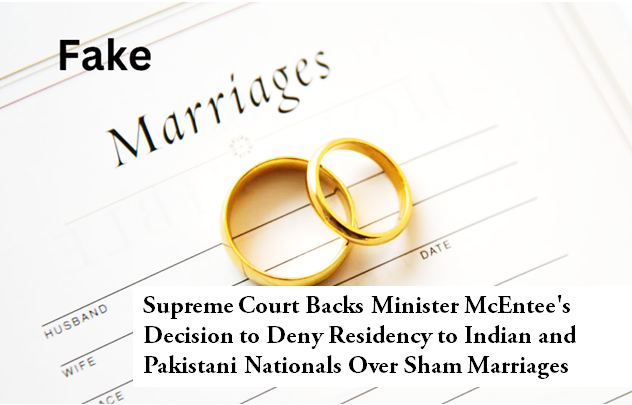Supreme Court Backs Minister McEntee’s Decision to Deny Residency to Indian and Pakistani Nationals Over Sham Marriages
Dublin: The Supreme Court has upheld Justice Minister Helen McEntee’s decision to deny residency to an Indian woman and a Pakistani man after it was discovered that they had entered into fraudulent marriages with European nationals to secure their stay in Ireland. Although these were separate cases, both involved fabricated marriages with striking similarities.
In her ruling, Justice Iseult O’Malley affirmed that the Minister’s decision was based on a thorough review of the documents submitted by the applicants, Indian national Sangeeta Rana and Pakistani national Lehrassib Ali. Justice O’Malley noted that all the relevant materials, including character references and employment histories, had been properly assessed by the Minister.
The cases stem from a 2018 government initiative that offered a special scheme allowing non-EEA nationals with student permits between 2005 and 2010 to remain in the country. Despite this scheme, which extended residency for certain students beyond the term of their visas, both Rana and Ali were denied residency by Minister McEntee—a decision now upheld by the Supreme Court. Justice O’Malley noted that their actions amounted to an attack on the integrity of Ireland’s and the EU’s immigration systems.
Rana, who arrived in Ireland in October 2009 on a student visa, was allowed to stay until October 2014. In September 2014, she married a Lithuanian citizen, securing a five-year residence permit under EU law, which allows non-EU citizens to remain in the country through a marriage of convenience. However, investigations revealed that her “legal” husband was living in Lithuania with another partner. Furthermore, Rana’s child, born in 2016, was fathered by an Indian citizen, casting further doubt on the legitimacy of her marriage. Rana failed to renew her residence card after it expired in 2017. The Minister found the documents she submitted to be false and misleading, designed to fraudulently obtain residency rights.
Similarly, Lehrassib Ali, a Pakistani national who entered Ireland on a student visa in 2007, saw his visa expire in 2013. In September 2012, Ali married an Estonian woman and subsequently obtained a five-year residency permit. However, a government investigation uncovered that his marriage was also fraudulent, as Ali falsely claimed to have a wife and children in Estonia.
Despite the fraudulent marriages, both Rana and Ali were granted permission to remain in Ireland under the long-term undocumented migrants scheme. However, their applications for residency based on their sham marriages were firmly rejected.
Irish Samachar English News
{OR} Kindly click to follow the Irish Samachar News channel on WhatsApp

